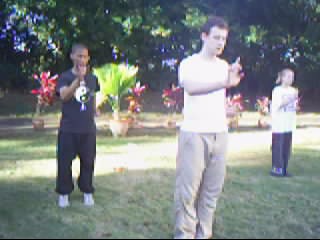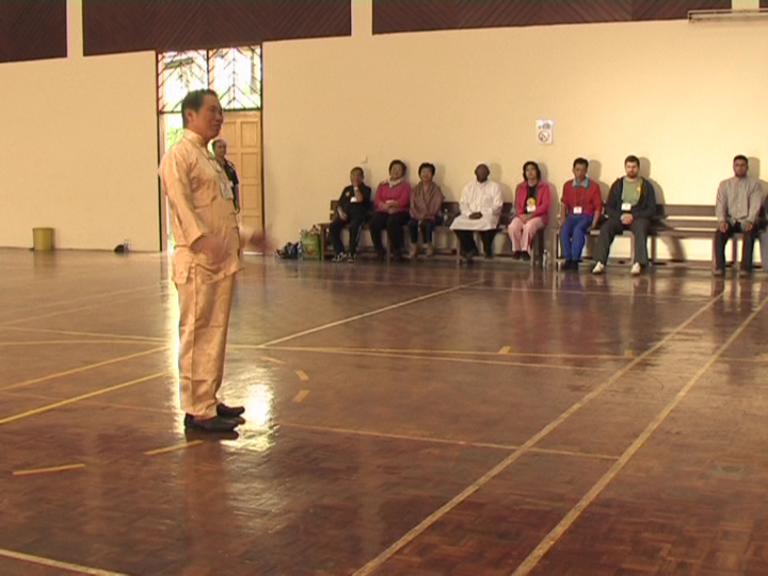PRACTICING AND MANIFESTING ZEN IN A BUSY WORK LIFE

Practicing Zen formally in One-Finger Shooting Zen
Question 14
How can Zen be practiced and manifested in a busy work life, for example in a managerial job -- where multiple requests arrive simultaneously, where decisions need to be taken quickly and accurately.
Sifu Andrea Zilio
Answer
Just do it!
In other words, in your busy work life, like when you are in a managerial job where multiple requests arrive simultaneously and where decisions need to be taken quickly and accurately, relax and attain mental clarity, make decisions quickly and accurately, and immediately carry out the decisions, without any delay or intellectualization.
If it is not feasible to carry out the decisions immediately, carry them out as soon as you can without delay and intellectualization.
If you find out that you have made a wrong decision, or there is a better decision, you make an instant change without fuss and without question.
Let us take an example. You are in your office with a client in front complaining that the goods he has received is not according to what he ordered, your telephone ringing, and your secretary rushing in saying that a supervisor has asked for emergency leave to take his sick wife to hospital.
Some managers not trained in Zen would be flabbergasted. But not you, you are special, you are trained in the Shaolin Wahnam way, which includes Zen.
You relax, clear your mind of all thoughts, grasp the situations, make some decisions quickly (usually quicker that what other managers need to realize what is happening), and act on your decisions immediately without fuss and without question.
You tell the client in front that you will presently look into the matter, tell your secretary to grant the supervisor leave, and pick up the phone. The person on the phone who is also a client says that your goods is due the following Wednesday but he does not have the cash to pay you as agreed, and asks whether he can pay you a week later. He says that he has just spoken to the sales manager but the latter has asked him to refer to you.
You tell this second cleint that you are sorry but it is a policy of the company to receive payment on delivery of goods. You will hold on to the goods for him for a week.
Then you call the production manager to come with the order form of the first client. Meanwhile you assure the first client that it is the policy of your company to serve customers to their satisfaction, and if you have made a mistake, you will rectify it immediately. You ask him what the mistake is.
He says that he has ordered blue T-shirts but you have sent him red T-shirts instead. He is becoming angry and says that he won’t do business with you again.
You remain calm and apologize for his inconvenience, but say that your production manager will soon arrive to confirm whether a mistake is made. If it is your mistake you will rectify it immediately and offer him a 20% discount for his inconvenience.
Your production manager arrives with the order form which shows that the first client actually ordered red T-shirts, not blue. It was his mistake, not yours. The client protests and claims that it couldn’t be.
You tell him politely that people do make mistakes sometimes. You also tell him that you just produce the goods according to his order, which bears his signature. He then becomes nervous.
As you reckon that you can easily sell the red T-shirts to other customers, you assure him not to worry and that you will produce blue T-shirts for him without extra cost. Knowing that you can produce the new T-shirts in three days if you set to work immediately, you ask your client whether it would be alright if you deliver the blue T-shirts in a week’s time.
His nervousness turns into a smile, and he thanks you for your kindness. He says that he will certainly recommend his friends to do business with you. You thank him for his business.
When the client has left, you tell your production manager to have the blue T-shirts ready in three days’ time and report to you, but deliver them to the client in a week’s time as agreed.
You then realize that you might have made a mistaken decision regarding the other client who requested later payment instead of payment on delivery of product. You call your accountant and find out that this client is a regular customer whose payment was always on time. You make a decision on the spot and tell your accountant that this time you allow him to pay a week later as he requested.
You call the second client and tell him that you have found out he is your regular customer who always pays on time. As a token of appreciation, you are prepared to modify the company policy this time for his benefit. You will deliver the goods on time but he can pay a week later. He is audibly happy on the phone, thanks you and says that he will recommend his friends to you.
Hence, with your Zen training you can overcome problems simply, directly and effectively. “Simply” means you do not fuss or intellectualize over the problems or their solutions. You do not, for example, grumble. thinking what a nuisance the first client is. You do not intellectualize whether the supervisor’s wife was really sick.
“Directly” means that you do not approach the problems in a redundant way, like telling the first client that red T-shirts are better than blue ones, or the second client that many promised to pay later but never did. You also do not lecture your supervisor on the importance of his wife practicing chi kung, like you do, so that she will never be sick.
“Effectively” means you solve the problems, often turning them into opportunities for improvement, like your clients promising to recommend more clients to you, and your supervisor likely to be a better worker as a result of your generosity.
Here you practice Zen, in the sense of putting your Zen training into daily life so as to manifest the benefits of your training. You can do so only if you have practiced Zen, in the sense that you have undergone Zen training.
Can you practice Zen, in the sense of undergoing Zen training, if you have a busy work life? Of course you can. In fact, one should because by becoming more cost-effective due to Zen training, not only he can accomplish his work in shorter time with better results, but also he has better health and vitality to make life more rewarding for himself and other people.
No matter how busy a person’s work life is, he does not work 24 hours a day. In fact, if he has to work longer than is normal, it is often more a sign of his incompetence than his diligence.
In our school, it takes only about 5 to 10 minutes to practice Zen formally. We may, for example, perform Standing Meditation, One-Finger Shooting Zen, Lifting Water, Cloud Hands, Golden Bridge or any Shaolin or Taijiquan. All these are methods whereby we can practice Zen formally.
We can also practice Zen informally in less than a minute. We just enter into a Zen state of mind, also called a chi kung state of mind or Tao. Hence, even when we are actually involved in making multiple decisions quickly and accurately, as in a managerial job, we can undergo Zen training informally. In fact, we should, as we will be more cost-effective in our decisions. We can be so proficient in our Zen training that our formal practice and informal practice merge together harmoniously.
This is Zen. We do not have to sit for hours in a lotus position to practice Zen. We practice and benefit from Zen in our daily life, irrespective of whether we are making serious decisions in our work, enjoying ourselves with our family or friends, or just lying on a beach doing nothing.
This is the significance of why when a monk asked a Zen master what Zen was, the reply was whether the monk had eaten his meal.

Practicing Zen informally while talking to a class in a Zen state of mind
The above is reproduced from the thread 10 Questions to the Grandmaster about Zen in the Shaolin Wahnam Discussion Forum
LINKS
